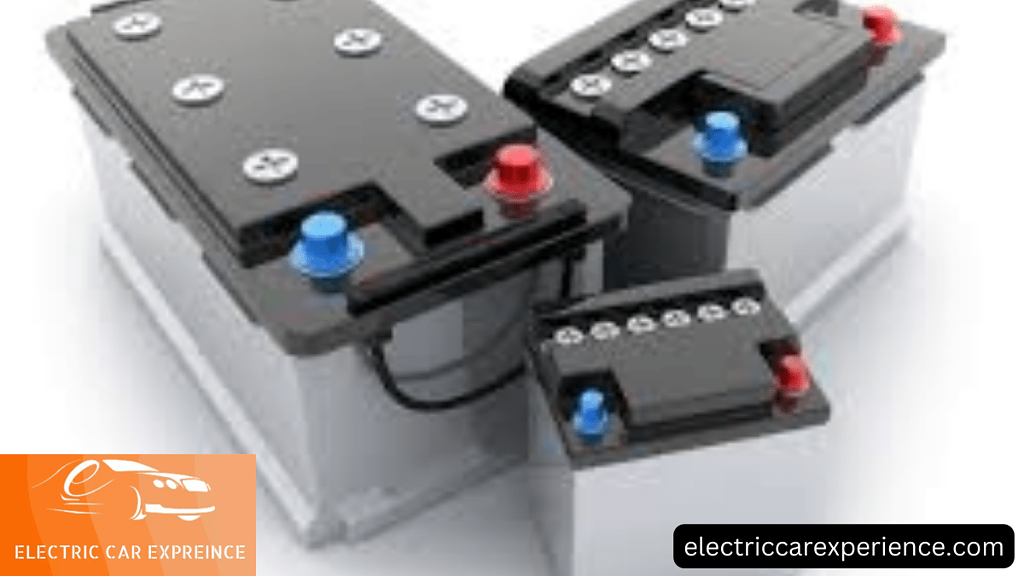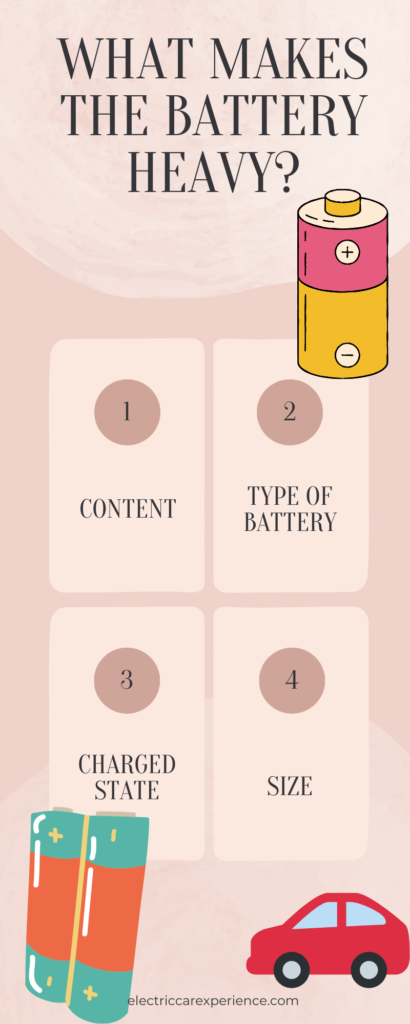
The theory of relativity says that energy has mass, through its equation E = mc2, from where we can calculate the mass of energy put into the batteries after charging.
Yes, if we go by the theory, a fully charged Electric battery will obviously weigh slightly more than the discharged battery because it has more energy. Now you may have doubt in your mind that it gains weight after charging or loses some mass after discharge.
While charging a battery, there is a change in chemical composition, making it gain weight though insignificant, discharging does the opposite.
[toc]
Type Of Mass Affecting the Weight of the Fully Charged Electric Battery
To understand the varying weight in an electric car battery, we need to understand the “mass”. There are basically two kinds of mass associated with this context.
The gravitational mass or the mass that is associated with the gravitational field and also related to your weight. The second one is the inertial mass, the mass accelerated by you when you are pushed by another external force.
There also exists a third definition is the basic learned in school, the amount of stuff in something, having hardly any relevance in this context.
The inertial mass and the gravitational mass for a charged battery are more than that of an uncharged battery, making the overall weight slightly increase. But if you count the number of particles in both, that comes out to be the same.
It’s just they are charged adding to the mass. Let us see some examples to illustrate. Consider an atomic bomb, which has a very small amount of uranium, converted into two atoms, keeping the number of nucleons the same.
The difference in mass post-fusion biproducts is negligible, but there is a huge difference in energy.
Now let us apply this to our theory of battery, having the knowledge that energy is mass, when batteries are in their charged state there is a huge difference in energy, but hardly any change in the mass. So, it is really difficult to detect any change in weight.
Another example is to think of a water turbine, The water present in the upper and lower portion is the same but resulting in the work to be done and power being produced.
How Much Does A Typical Battery Weight?
While making a shift towards electric vehicles this is the most often question that comes up in mind. The weight of an electric battery depends on various factors, such the size, type, capacity, and also manufacturer.
On average the electric battery weighs between 800 – 1000 pounds (~453 kgs), some may even weigh more than 2000 pounds. Though it is believed that a heavy battery provides more stability to the vehicle.
Smaller Electric cars can even use less than 500-pound batteries while larger Electric car cars go for more than 2000 pounds.
Let us have a look at the weight of a few Electric car’s batteries:
| Electric Vehicle | Battery size (kWh) | Weight(pounds) |
|---|---|---|
| Nissan Leaf | 40 – 62 | 668 – 903 |
| Chevrolet Bolt | 65 | 960 |
| Tesla Model 3 | 82 | 1060 |
| Tesla Model S | 85 | 1200 |
| GMC Hummer Edition 1 | 210 | 2923 |
How Does Fully Charged Electric Battery Affect The Weight?
As we have already discussed before the change in weight due to charging is negligible, and energy has mass, but it’s immeasurable in this case.
Let us consider a battery size of 100kWh, while converting to joules we get it as 36000kJs.
E = mc2, so, 36000kJs = m*c2, where c is the speed of light.
m = 36 * 106 / (3*108, * 3* 108)
= 4 * 10-10, or we can say 0.4 milligrams.
| Charging Percentage | Change in weight (milligrams) |
|---|---|
| 100 | 0.4 |
| 80 | 0.32 |
| 50 | 0.2 |
| 20 | 0.08 |
What Makes the Battery Heavy?

The heaviest component of the car is its battery which contributes to most of its weight. It needs to be quite strong enough to make a powerful electric car. There are various factors that contribute to the weight of the battery.
Content:
Lead is a heavy metal, weighing about 11 grams per cubic meter.
Additionally, most vehicles have an 8-year/unlimited mile warranty that covers any long-term Electric car batteries capacity losses that may arise.
contain lead electrolytes making them much heavier. The average lead battery weighs 40-45 pounds.
Type of Battery:
Different batteries have different chemical compositions. For example, lead batteries are much heavier than Lithium batteries. They also have aluminum casting adding to their weight.
Though the Japanese are trying to have a plastic casting that may combat the heat produced.
Charged State:
For electric vehicles, there is no significant change in weight. The charging means the movement of molecules from one point to another producing energy. This produced energy has no significant change in tangible mass, it is infinitesimal.
Size:
The battery’s size corresponds to the devices it powers. As a result of being broader and denser than a remote control battery, a smartphone battery will be heavier.
Similarly, a car battery is larger, wider, and more densely packed than a battery for a smartphone or remote control.
Time To Fully Charge A Battery.
There is no such constant value for the battery to charge fully. It depends upon the charge amps and the type of chargers used.
If you are using a 20-amp charger it may take 3-5 hours to charge, while using 5-amp charger 8-12 hours to charge it fully.
A standard charger may take a shorter time than a trickle charger due to its steady current and charge.
“Batteries are the most dramatic object. Other things stop working or they break, But Batteries… They Die.”
~ Demetri Martin
How To Get A Longer Battery Life For Electric Cars?
Generally, we have an impression that maintaining a charge ranging between 20% – 80%, like mobile phones may increase the life span of the battery and maintain good health.
Once you charge it to 100%, then we try to maintain a range. But if it dips below 20%, we have range anxiety. In the case of Electric car batteries, they are a group of cells and may not hold the same amount of charge uniformly across them all.
As they maintain a series-parallel combination, if one gets disturbed the entire pack gets affected. So, it’s better not to charge it fully and maintain some buffer.
Few tips to follow:
· Charge it to 80% and not 100%
· Try not to drop it below 20%
· Avoid regular or fast charging techniques.
Rapid charging aids overheating which can reduce the life expectancy of the battery. Typically, an electric car battery lasts for 15 – 20 years but can vary due to various factors.
The life span of Electric car batteries degrades if used in high temperatures and warm climates. The optimum is 70 degrees, so premium Electric cars may maintain thermal management systems to reduce the heat in a warmer climate.
Let’s find something interesting from electric car enthusiasts.
Conclusion
This article explained the change in weight when a battery is fully charged, what all factors can affect the weight of your battery other than charging, How the weight of a battery can be an advantage to your safety measures, what steps should you take to expand the lifespan of your battery.
The battery’s energy density is another important weight-related factor. Higher the density, the better the performance. The lithium-ion battery is the highest energy density battery improving the performance of electric cars.
So, charging and discharging can hardly add weight to your battery, it’s just the movement of molecules from one plate to another making them more energetic and improving their performance.
FAQs
Is there a risk of exploding for overcharged batteries?
Overcharging causes the rate of grid corrosion in the internal battery plate separators to increase which may lead to short-circuiting and eventually in exploding. Overcharging increases the oxygen and hydrogen levels rise turning into an explosion.
What is the cost of replacing an electric battery?
In the USA, the warranty of an electric battery varies somewhere between 8 – 10 years or 10,000 miles. The cost of the battery varies greatly due to the capacity of the battery, the average cost of the battery will be around $10,000.
What are the various kinds of batteries available for electric cars?
There are basically three main types of batteries from which customers can choose:
Alkaline, nickel metal hydride, and lithium-ion batteries. Each of them has its own pros and cons.
How many batteries are required to run an electric car battery?
Typically, two batteries are required to run an electric car. One is located at the front, and another is located at the rear of the vehicle. Though the lithium-ion battery is usually smaller and lighter than that lead-acid battery and NiMH, it has a higher energy density and the ability to store more power.
How long does a Tesla battery last?
The tesla battery usually lasts for 500 charging and discharging cycles. However, it may vary if they are plugged into outlets or driven in extreme climates. Their lifespan even decreases if they are not in use for a longer period.
Post Related to Electric Car & Battery
- New California Electric Car Law 2026-2035: Gasoline vehicle sales banned by 2035- An ultimate guide 2023
- Electric Car Battery Weight Per KWh
- How much does it cost to dispose of an electric car battery?
- Do electric car batteries emit radiation? Are Electric Cars Harmful? | do batteries emit Electromagnetic(EMF)?-A Complete guide 2023
- How Much Energy is Needed to Produce Electric Car Battery?
- How Do I Put Tesla In Neutral When Battery Is Dead?
- Can We Add Additional External Battery in Electric Car?- An ultimate guide 2023
- Tesla Model S Error Codes (Error Messages)- Complete Guide 2023
- How Much Does It Cost To Dispose Of A Tesla Battery?
- How Often To Replace An Electric Car Battery?
- Tesla 21-70 Battery Cell Specifications
- Tesla 4680 Battery Chemistry
